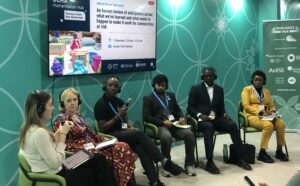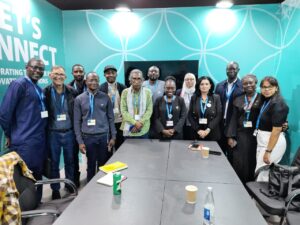COP29, held from November 11-22, 2024, in Baku, Azerbaijan, will spotlight climate finance and urgent action against global warming. Leaders, NGOs, and civil society representatives will push for updated climate plans, aligned with the Paris Agreement, to limit warming to 1.5°C. GNDR and its members are actively participating, urging inclusion and climate justice, particularly for vulnerable communities disproportionately affected by climate impacts.
GNDR staff and members are in Azerbaijan representing the voice of civil society. Follow their updates from Baku:
Thursday 14 November 2024
Averting climate risks through early warning climate information
- GNDR’s climate change lead Adessou Kossivi moderated GNDR member Women Environmental Programme’s side event: Averting climate risks through early warning climate information.
- We heard how floods and drought in Togo have a huge impact on the lives of rural women. Their resulting displacement leads to loss of livelihood. However, providing rural communities with advance climate information and guidance on its impacts helps them prepare more effectively.
- Loss of education is another, often overlooked, impact of disasters. Children are missing out of school due to floods.
- Climate-induced disasters impact vulnerable communities and leave them dependent on humanitarian aid.
- We heard an example from Malawi where early warnings are helping communities to prepare and take action. In Nigeria, communities engage with meteorological offices and establish communication with the communities who might not have access to a smartphone, as well as regular radio communication.
Signalling change: one year on from the Getting Ahead of Disasters Charter – Risk-Informed Early Action Partnership (REAP)
The event took stock of Getting Ahead of Disasters Charter‘s first year, and mapped out a course for the future.
The panel was formed of endorsers of the Charter – led by REAP, a partnership in which GNDR is part of – and highlighted approaches to change the way that they work. High-level representatives from Samoa and the UK, and other panellists representing stakeholders from Nepal, Afghanistan and FAO, participated in a discussion on how to take the Charter to scale in the coming year.
Friday 15 November 2024
High-Level Roundtable: Network building to strengthen peace and resilience in climate-vulnerable settings
- This session explored the Baku plan on climate change impacts for fragile countries
- The panel considered the challenges of adaptation and food security, which are the main drivers of poverty
- Speakers from regional development banks shared their collaboration efforts in resilience building to support climate actions and social development
- Timely investment could strengthen a country’s capacity
- With strategic partnerships, and private sector engagement, it is possible to deliver support to vulnerable populations
- Climate and conflict need to be priorities alongside the scaling up of finance
An Honest Review of Anticipatory Action: Making It Work for Communities at Risk.
- The event was hosted by OCHA and had UNDRR, IFRC and GNDR on the panel, among others
- GNDR was represented by Climate Lead, Adessou Kossivi
- The event highlighted that anticipatory action is integral to climate action
- It spoke of the importance of locally informed and locally led anticipatory action and for policies and tools to be highly contextualised to the local context

GNDR’s Adessou Kossivi on the panel for: An Honest Review of Anticipatory Action: Making It Work for Communities at Risk
Meanwhile, GNDR also participated in a high-level event hosted by the government of Vanuatu. This event used a different format with ‘key informants’ sat in a circle on mats from Vanuatu. It enabled an open discussion on the challenges and opportunities for action on loss and damage within the UNFCCC. Sophie Rigg represented GNDR as a key informant.
Saturday 16 November 2024
GNDR, with the Avina Foundation, are co-leading Challenge 6: Ensuring the incorporation of culture and indigenous and local knowledge at every level of decision-making of the Resilience Hub.
Incorporating cultural and Indigenous and local knowledge into climate decision-making is essential for achieving more inclusive, effective, and equitable climate and resilience policies. However, whilst this is widely recognised, policies and climate action often fail to properly take this into consideration. On Saturday GNDR supported members and partner organisations in co-hosting two sessions at the Resilience Hub:
-
Resilience Rooted in Tradition: Integrating Indigenous and Local Knowledge for Adaptation and Loss & Damage Solutions
Co-hosts: Government of Vanuatu, Fauna & Flora, IIED, Avina, BRAC
-
Paving the way for Resilient Solutions: The Leadership of Indigenous and Locally-Led Philanthropic Ecosystems
Avina, Voices for Just Climate Action Alliance, WINGS, SouthSouthNorth, International Funders for Indigenous Peoples (IFIP)
Read our key takeaways for Policymakers as Challenge Co-Lead and the way forward for COP30.
GNDR members meeting with USAID
A total of 11 GNDR members, along with Chair of the GNDR global board, Emmanuel Seck, and Ghada Ahmadein, GNDR’s National Focal Point for Egypt, met with USAID. Emmanuel presented his vision of GNDR as a network for risk reduction and resilience building. Adessou Kossivi, GNDR’s climate lead and Regional Lead for Africa, gave an overview of the projects we have implemented with USAID while Ghada dove into the detail, successes and and importance of our flagship Views from the Frontline (VLF) project. Our members shared their country’s experience and emphasised the local actions they have been implementing in their respective communities.

GNDR members meet with USAID at COP29